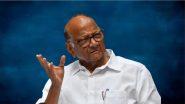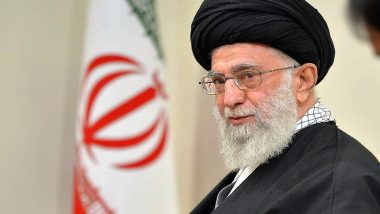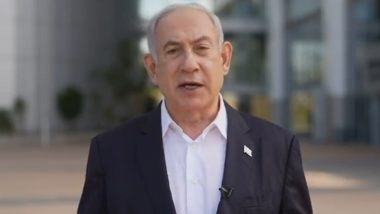Tehran, September 17: Iran's supreme leader Ayatollah Ali Khamenei on Tuesday ruled out negotiations with the US, as tensions mount between the arch-foes after Washington blamed Tehran for attacks on Saudi oil installations. "The policy of 'maximum pressure' against the Iranian nation is worthless and all Islamic Republic of Iran officials unanimously believe there will be no negotiations with the US at any level," he said, quoted on his official website. Tehran and Washington have been at loggerheads since May last year when US President Donald Trump withdrew from a 2015 nuclear deal and began reimposing crippling sanctions in a campaign of "maximum pressure".
Iran responded by scaling back its commitments under the landmark accord, which gave it the promise of sanctions relief in return for limiting the scope of its nuclear programme. The United States said on Monday that its military was readying a response to the "unprecedented" weekend attacks on Saudi oil facilities. Trump said the United States was ready to help its key ally Saudi Arabia after the attacks that triggered a record leap in world oil prices. Donald Trump Sanctions Iran’s Dead Leader Ayatollah Khomeini, Not The First Time He Messed Up Names.
"I'm not looking to get into new conflict, but sometimes you have to," he said. "That was a very large attack, and it could be met by an attack many, many times larger. "Certainly, it would look to most like it was Iran," Trump added. US Secretary of Defence Mark Esper also singled out Iran as a regional destabilising force, while stopping short of directly accusing Tehran over the strike.
The US military, he said, was working with its partners to "address this unprecedented attack and defend the international rules-based order that is being undermined by Iran." A day after the attacks, the White House had said Trump could meet his Iranian counterpart Hassan Rouhani on the sidelines of the United Nations General Assembly in New York next week.
Maximum Pressure
But Khamenei said any talks with the Americans would lead to the "imposition of their demands on Iran" and mean their policy of "maximum pressure" was a success. Speaking to students, he said that was the reason why Rouhani, Foreign Minister Mohammad Javad Zarif and other officials "unanimously declared we won't negotiate with US bilaterally or multilaterally". Rouhani has already rejected the possibility of direct negotiations with the US unless it lifts all sanctions.
He has said even if the sanctions are lifted, any talks must be held in the framework of the nuclear accord. The supreme leader reiterated this on Tuesday, saying that if the US "repents" and returns to the Joint Comprehensive Plan of Action, then it can talk with Iran along with other parties to the deal.
"Otherwise no negotiation will take place" between officials from the Islamic republic and the United States "at any level, whether in New York or anywhere else". Yemen's Iran-aligned Huthi rebels claimed responsibility for Saturday's attacks on Abqaiq -- the world's largest oil processing facility -- and the Khurais oil field in eastern Saudi Arabia.
Saudi officials said the attack involved "Iranian weapons," but likewise fell short of directly accusing their regional arch-rival. Rouhani said the attacks were an act of self-defence by the Huthis against the Saudi-led forces conducting an air campaign against them since 2015.
"Yemen is the target of daily bombings... The people of Yemen have been forced to respond, they are only defending themselves," the Iranian president said in Ankara. The UN General Assembly debate opens on September 24.
(The above story first appeared on LatestLY on Sep 17, 2019 01:37 PM IST. For more news and updates on politics, world, sports, entertainment and lifestyle, log on to our website latestly.com).













 Quickly
Quickly





















